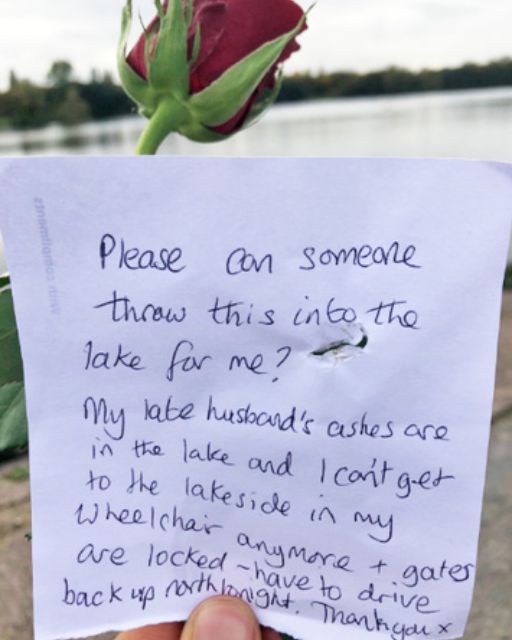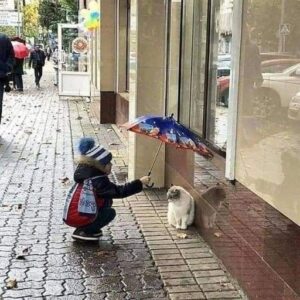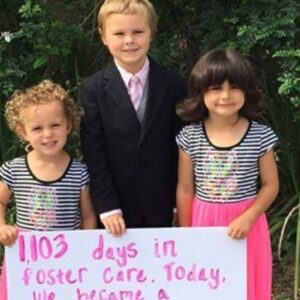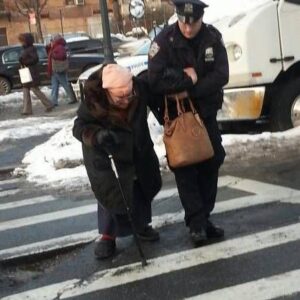I noticed it as I was passing the lake—a lone red rose with a message on it, lying close to the water’s edge. I picked it up and read the lines out of sheer curiosity.
Could someone just toss this into the lake? My wheelchair no longer allows me to reach the lakeside where my late husband’s ashes remain. I have to drive back up tonight because the gates are locked. Many thanks, x
My chest constricted. I checked around, but the person who had left it had already left.
Feeling the weight of what I was going to do, I gripped the rose a bit more tightly. This was more than simply a flower; it was a delicate bloom that represented longing, pain, and love.
I moved to the water’s edge, inhaled deeply, and then let it go.
And as I watched it fade away, I came to the unexpected realization that this deed of generosity would permanently alter who I am.
I kept thinking about the note the following morning as I sipped my coffee on my patio with a view of the lake. Who was she? What was her tale? Like the ripples from where the rose had landed, the questions whirled around in my head. It seemed incomplete, as if there was yet more to discover.
I made the decision to go to the neighborhood café beside the park entrance later that day. Perhaps there was a person there who knew who had left the rose. I saw an elderly woman seated by herself at a corner table as I placed my normal order for a latte. She gazed out the window at the lake while wearing a cozy cardigan over her shoulders. I was drawn to her mannerisms, which were a combination of calm strength and grief.
After a brief moment of hesitation, I went up to her. “Pardon me,” I murmured softly, “do you know anyone who might have recently left a rose by the lake?”
Her eyes relaxed and then broadened a little. She motioned me to take a seat. She paused, then replied, “You must be the one who found it.” I was immediately put at ease by the kindness in her voice. “I’m grateful.”
I answered, “Yes, I threw it into the water for her.” “How did you find out, though, if I may ask?”
She gave a small smile. “Because she is my daughter-in-law, Clara, and I am Evelyn.”
Evelyn gave a detailed explanation. Two years ago, her son Daniel died of an unexpected illness. Since college, he and Clara had been inseparable. They used to visit the lake every weekend, even during the winter, bundled up with thermoses of hot chocolate, so when he passed away, they spread his ashes in the lake, which was their favorite site. Clara no longer went often, though, not because she didn’t want to, but rather because life had gotten more difficult.
“She has been having difficulties,” Evelyn added. She threw herself into her work after Daniel’s death. Even with me, she doesn’t say much these days. However, she called me in tears last week. She was unable to visit the lake herself, but she still wanted to leave him something special.
Evelyn then proposed leaving the rose with a letter in the hopes that a good person would discover it. And presumably I had found it by accident, or even by Daniel himself.
I kept running into Evelyn at the café or on my walks by the lake throughout the course of the following few weeks. She told me more about Clara and we began talking on a regular basis. How she felt incredibly lonely despite her great independence. How, despite the fact that Daniel’s old leather jacket was much too big for her, she occasionally wore it. How she believed she needed to do things alone and turned down assistance from Evelyn and others.
Evelyn turned to face me one afternoon as we sat together and watched the sun set. She whispered, “Do you think you could meet her?” I mean, Clara. She needs someone who is not related to us. Someone who is understanding but impartial.
I paused. It was intimidating to meet strangers in such sensitive situations. However, a voice inside of me said, “Yes.” I therefore concurred.
Evelyn invited me to dine at her house a few days later. I instantly recognized Clara from the pictures Evelyn had shown me when she opened the door. Her piercing emerald eyes and prominent cheekbones gave her a younger appearance than I had anticipated. But no amount of makeup could cover up the weight in her eyes.
After exchanging courteous greetings, we discussed commonplace topics like the weather, literature, and music while enjoying homemade lasagna. Gradually, the topic of conversation turned to Daniel’s memories. Clara was first reserved and gave only succinct responses. However, she started to open up as the evening went on.
Gazing into her wine glass, she mutely said, “I miss him every day.” “Not just the significant events, but also the minor ones. He always huddled the blanket while we watched movies, for example. or his off-key singing in the shower.
Instead of wiping the tears from her eyes, she allowed them to fall. She showed me vulnerability for the first time, and it was lovely.
As the weeks stretched into months, I discovered that I was assimilating into Clara’s universe. As a buddy, not in a romantic sense. Someone she could trust without fear of criticism. We experimented with cooking, hiking routes, and painting lessons as new pastimes. The barriers she had erected around herself appeared to be eroded by each activity.
Then the unexpected turn of events occurred.
Clara arrived at my house one Saturday morning with an especially enthusiastic expression. She held up a sketchpad and said, “I need your help.” Designs for a memorial bench she intended to erect by the lake were included. In addition to paying tribute to Daniel, a plaque would bear the inspirational words, “Love transcends boundaries, both seen and unseen.”
I honestly told her, “It’s perfect.” “But why ask me?”
“Because you’re the reason I started believing in love again,” she added, her voice wavering a little. It’s the kind of love that binds people together by their common humanity, not romantic love. You reminded me that it’s acceptable to rely on other people.
Like a tidal wave, her words struck me. I believed I was assisting her in her recovery all along. In actuality, though, she was also healing me. I had been living a careful life and avoiding relationships before I discovered that rose. I felt more alive than I have in years because of Clara and Evelyn.
It was a clear, beautiful day when the bench was unveiled. To honor Daniel’s memory, friends, family, and even complete strangers gathered around the lake. I looked at Evelyn while Clara talked, her voice firm and powerful. With tears running down her cheeks, she smiled at me knowingly.
Clara gave me a little envelope at the conclusion of the ceremony. There was another note inside:
“I want to express my gratitude to the stranger who discovered my rose for serving as a liaison between Daniel and myself. You helped me remember that love changes but never dies. Please continue to be kind to everyone. You will never understand how important it is. With appreciation, Clara.
The underlying lesson of this adventure became clear to me as I read those words: Sometimes, deeds of compassion have unanticipated knock-on effects. They remind us of our common humanity, bring us together, and heal us.
Please tell others about this story if you liked it. One act at a time, let’s spread kindness like wildflowers. ❤️






